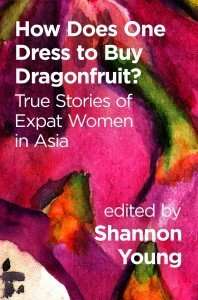Book Review – HOW DOES ONE DRESS TO BUY DRAGONFRUIT? edited by Shannon Young
 How Does One Dress to Buy Dragonfruit?
How Does One Dress to Buy Dragonfruit?
True Stories of Expat Women in Asia
In this collection, twenty-six women reveal the truth about expatriate life in modern East Asia through original works of memoir and creative non-fiction. Their experiences are varied and unique, demonstrating that expat women’s lives go far beyond the stereotypical. The writers hail from a dozen different countries and walks of life. Some are well-known; others are fresh voices adding nuance to the expat conversation. Through deeply personal accounts, they explore what they have learned about themselves and the world through their lives abroad. Together, they create a portrait of the modern expatriate experience that will both resonate and inspire. (Signal 8 Press)
BOOK REVIEW
A decade ago I would never have thought to pick up a collection of essays. Now I’ve come to realise that a collection of shorter works are the perfect thing for me to dip in and out of when life is trying it’s hardest to limit my reading time, as has recently been the case. And the appreciation of the non-fiction essay format? I think that comes with age and an increasing willingness to consider and reflect on the opinions of others.
The wonderfully titled collection How Does One Dress to Buy Dragonfruit? comprises 26 essays contributed by women recounting and reflecting upon their experiences as an expat in East Asia. Editor Shannon Young selected these titles from a reported 86 pieces originally offered up for inclusion in this anthology.
Whenever individual works are presented as a package, even those from a single author, they are inevitably compared with and rated relative to the others. So it’s no surprise that across the 26 pieces the writing styles and writing quality varied along with experiences of the women.
One of my favourite titles ‘The Weight of Beauty’ by Dorcas Chen-Torzun poignantly highlights the extent to which people make judgements based on people’s outward appearance (ethnicity, social standing, etc) and the perils of doing so. This is not necessarily a problem restricted to Asia, but the expectation that someone whose ancestry (and hence outward appearance) is for example Chinese should be able to speak Chinese does seem to be a prejudice encountered all too often in this region.
Some essays are particularly candid and confronting such as India Harris’ juxtaposition of devout Philippine women and the part they play in expat infidelity in ‘The Rainiest Season’ and Jennifer S Deayton’s depiction of the poor in Chinese cities in ‘Bread and Knives’ ,
Shell-shocked peasants, a constantly replenishing supply, flocking to the southern cities to polish computer parts and to shovel shit, to fall off building sites and to head xiang qian! Towards money. I’ve seen the stunned, dazed expressions on their faces, like time travelers dropped into a future that they can’t comprehend.
This reflection of Kaitlin Solimine in her essay ‘Finding Yuanfen on a Chinese Bus’ brought back memories of my own experience in Beijing in the 90s,
What my friends and I once lovingly termed our “Beijing boogers” (the black coal soot clogging your nostrils) was being replaced by the more noxious, pervasive smell of industry – factory fumes and automotive exhaust. Near the city’s quaint hutongs, the shadowed alleyways that made me feel both protected and liberated, construction cranes towered menacingly – in the next decade, over half of Beijing’s famed architecture would meet the wrecking ball.
and I found her insights into human nature very perceptive and her personal journey compelling.
I laugh to myself, incapable of explaining this hilarious linguistic hiccup to anyone who’d understand, and I realize that laughter, like loneliness, makes us human. It indicates our pleasure or our need for validation. With no one to share my laughter, the joke loses potency, but also makes me feel enough outside myself to witness the necessity of being here, alone. It’s only a glimmer, a brief sheen of a face I hope to become.
In ‘Bangkok Through the Eyes of an Indian Girl’ Neha Mehta’s use of her expat experience in Thailand to bring into stark focus the inequity for women in the country of her birth was very powerful. I also found a heartwarming piece by Leza Lowitz ‘Here Comes the Sun’ about finding a partner later in life and the experience of adopting a child in Japan, very moving.
The pieces that really shone in this collection were those where the woman’s life experience was specifically influenced by the East Asian culture she found herself living within. In some cases though I felt the problems highlighted would be experienced by an expat no matter the country, such as the sacrifice by one partner giving up their career and moving away from family so that the other can take up a job in the new country, or even more generally the experience of pregnancy.
Pregnancy was featured in this collection more often (and described in more detail) than I personally thought necessary but where the pregnancies were particularly influenced by Asian culture their inclusion seemed appropriate. However a few of the pregnancy stories, although moving, weren’t in my mind sufficiently distinctive of the Asian expat experience to add value to this particular collection.
How Does One Dress to Buy Dragonfruit? is a distinctive and colourful, at times confronting, thought-provoking and moving collection of experiences by women who have chosen paths not often taken.
BOOK RATING: The Story 4 / 5 ; The Writing t / 5

BUY THIS BOOK:
Book Depository | Booktopia (Aus) | B&N | Amazon
Genre: Short Stories/Essays, Drama, Non-Fiction
Editor Information: Shannon Young is an American twenty-something currently living in Hong Kong. She is the editor of an anthology of creative non-fiction by expat women in Asia and the author of e-books including a mini travel memoir, The Olympics Beat, and a novella, The Art of Escalator Jumping. Her memoir, Year of Fire Dragons: An American Woman’s Story of Coming of Age in Hong Kong, will be published by Blacksmith Books in the autumn of 2014.
A graduate of Colgate University in New York, Shannon’s writing has appeared in the Hong Kong Women in Publishing Society’s anthology, on numerous websites, and on an iPhone travel app. She writes a blog called A Kindle in Hong Kong and likes to spy on other people’s books on the train.
Other reviews of How Does One Dress to Buy Dragonfruit : Wanderlust & Lipstick
* My receiving an ebook copy of this title from Signal 8 Press for review purposes in no way hindered the expression of my honest opinions in the above.

